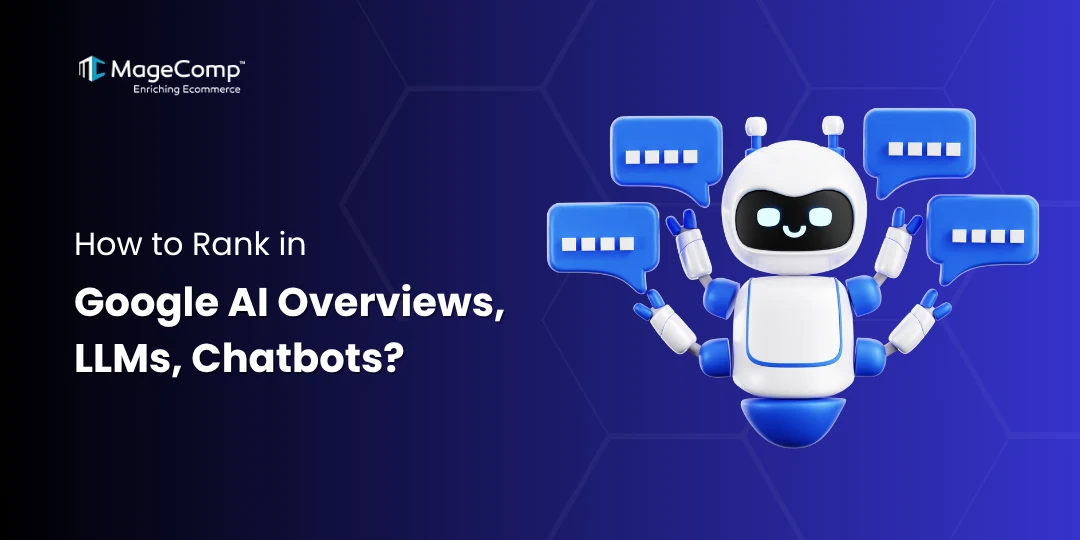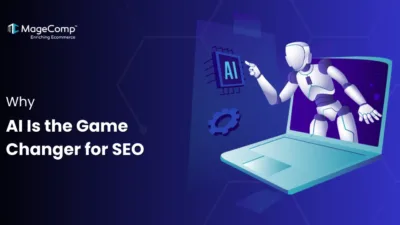Do you know what happened on 30 November 2022?
Yes, you guessed right. ChatGPT, a revolutionary tool, was launched by OpenAI. None of us ever imagined that this excellent tool would change the way we search, think, analyze, research, and even implement.
The launch of this tool gave birth to tons of predictions, one of which was from Gartner, which predicted that the search engine volume is expected to go down by 25% by February 2026. Who is to blame for this? Of course, the AI chatbots.
What’s the reason for this sudden shift? As you know, in search engines, one has to visit multiple sites to find the exact answer they are looking for, while in AI chatbots, you just have to write the search query, and the AI tool will give you the exact answer without any need to visit multiple websites.
This sudden shift once again describes that SEO is changing AGAIN…
To stay with the trend, even Google launched AI overviews on 14th May, 2024. This introduced us to one more important term called Search Generative Experience.
As per estimation, over 8.5 billion searches are made through Google every day, and the only key to staying visible to your customers is to optimize your website with AI-powered search.
In this blog, we will go through the points with which you can rank your website in Google AI Overviews and other chatbots.
AI Chatbots – The New Search Engines
Even though AI Chatbots are becoming very popular, their users are relatively less compared to the number of users of traditional searches. According to an analysis across different countries have concluded that ChatGPT is the most used generative AI tool, but only 2% of UK citizens and 7% of the US citizens use it every day.
However, we cannot deny the fact that these numbers are estimated to increase in the near future, and even AI is impacting the way of our traditional searches.
Google launched its AI Overviews feature in response to ChatGPT, and Bing is using a combination of Microsoft and OpenAI technology to build their AI search experience.
With these tools, new AI-powered search engines like Perplexity AI and ChatGPT search are open for all users. Research indicates AI Overviews are now sometimes showing for 47% of all Google searches!
With new AI tools continuously being created, and generative AI playing a larger role in traditional search, SEOs need to realise that we are not just optimising for ‘search algorithms’, we are optimising for AI algorithms, as visibility opportunities will continue to expand from generative AI responses and results.
Brace Yourself for the AI Optimization Era
The increasing use of AI tools for searches has introduced us to new phrases of SEO, Artificial Intelligence Optimization (AIO), and Generative Engine Optimization (GEO). We accept it or not, but AI optimization is already leaving a significant impact.
However, GEO is said to be highly beneficial for websites with lower rankings, and even research has found that campaigns created using different GEO strategies have recorded increased visibility by 45%.
In the end, with the adoption of AI continuing to rise, more and more of your target audiences will be using these tools for their first search. If you are talking to humans, B2B buyers, decision-makers, journalists, etc., then you need to know which tools they are using and optimise accordingly.
How to Optimize Your Content for Generative AI?
1. Starting from scratch – Traditional SEO
Even though AI is transforming content discovery, organic search signals still play a foundational role. Generative AI often pulls from highly ranked, authoritative pages, so you must begin with:
- In-Depth Keyword Research – Identify not only primary keywords but also long-tail and conversational queries that AI might use in user interactions. Tools like SEMrush, AnswerThePublic, and Google’s “People Also Ask” can uncover these.
- Content Relevance & Intent Matching – Align your content with the user’s intent, whether informational, transactional, or navigational. Generative AI prioritizes content that best satisfies the users’ query.
- SEO-Optimized Structure – Use SEO best practices like optimizing meta tags, URL slugs, image alt texts, and including schema markup. These help search engines and AI models understand your content clearly.
- E-E-A-T Compliance – Follow Google’s E-E-A-T guidelines (Experience, Expertise, Authoritativeness, and Trustworthiness), as AI models are trained to prefer such sources.
- Technical SEO – Ensure fast page speed, mobile responsiveness, and a secure (HTTPS) connection. These elements indirectly affect how AI ranks or pulls your content.
2. Make your Content Generative AI-friendly
Generative AI doesn’t “read” content like humans; it interprets it through structure and clarity. To make your content AI-friendly:
- Logical and Hierarchical Headings – Use proper heading tags (H1, H2, H3) to create a clear content hierarchy. This helps AI understand context and group relevant ideas.
- Scannable Layouts – Break content into short paragraphs, and use bullet points, numbered lists, and tables wherever appropriate. These formats are more likely to be picked up in AI snippets.
- Direct Answer Format – Start with a concise, accurate answer followed by an explanation. This mirrors the “featured snippet” structure AI prefers.
- FAQ & How-To Sections – AI tools often pull from structured Q&A formats. Create a section that anticipates and answers user queries related to your topic.
- Structured Data (Schema Markup) – Add schema tags like FAQPage, HowTo, Article, or Product to give search engines and AI clearer context and metadata about your content.
3. Optimize to be an Information Source for AI Tools
Generative AI systems prioritize credible, consistent, and expert-backed content. To be recognized and sourced by these models:
- Develop Topical Authority – Instead of scattered blog topics, focus on building a robust content cluster around a specific niche. AI tools value expertise and consistency over quantity.
- Author Transparency and Expertise – Use author bylines with credentials, experience, and links to author pages. Google and AI models factor in author authority and reliability.
- Cite and Be Cited – Reference trusted sources to support your facts, and aim to get cited by others through guest posting, press mentions, and research-based content.
- Content Freshness and Maintenance – Regularly update articles with the latest data, trends, and examples. AI tools tend to deprioritize outdated content.
- Positive Digital Footprint – Maintain a strong brand presence across multiple channels like LinkedIn, Wikipedia, Google Business Profile, etc., to signal trust to AI algorithms.
Include AI Optimization in your SEO Strategy
In the current landscape of AI through 2023, it is most effective to think about optimizing content with AI through a total SEO strategy.
Sure, things have changed ever so slightly in the weighting of things to consider with AI Optimization (AIO), but the content principles, such as relevance and accuracy, have held strong. This is further supported by the observed strong connection between organic search rankings and mentions of generative AI.
The most significant difference in AIO is that AI algorithms often prefer widely accepted, credible information. Therefore, you want to get your content out in as many locations as possible (your site, third-party sites, social media, forums, etc.) The more citations, quotes, and links from trustworthy sources you can include will only help improve visibility.
If you’d like help transforming your SEO strategy to optimize for generative AI, please get in touch with us.
Frequently Asked Questions
1. How to rank on Google AI overview?
To rank in Google AI Overviews, create high-quality, well-structured, and authoritative content that answers user queries clearly. Use proper formatting, schema markup, and follow SEO best practices to increase AI visibility.
2. Does Google allow AI content to rank?
Yes, Google allows AI-generated content to rank as long as it’s helpful, accurate, and adheres to its quality guidelines. Content should demonstrate expertise, trustworthiness, and satisfy user intent regardless of how it’s created.
3. How to rank on AI search results?
To rank in AI search results, structure your content with clear headings, FAQs, and direct answers. Build topical authority, optimize for SEO, and ensure factual accuracy to appeal to AI-driven systems.
4. How to win AI Overviews?
To win AI Overviews, focus on E-E-A-T (Experience, Expertise, Authoritativeness, Trust), provide precise and up-to-date answers, use structured formats, and maintain a strong presence in organic search rankings.
5. Is Google rejecting AI content?
Google does not reject AI content by default. It evaluates content based on quality, not its origin. Poorly written or spammy AI content may be penalized, but valuable AI-generated content can perform well.
6. What is the Google AI Overview?
Google AI Overview is a feature in Search that uses generative AI to summarize complex queries with direct answers, sources, and follow-up prompts, aiming to help users find information faster and more efficiently.
7. Does Google penalize ChatGPT content?
Google doesn’t penalize ChatGPT content solely because it’s AI-generated. However, if the content is inaccurate, low-quality, or spammy, it may be devalued in search results, just like poor human-written content.
8. How to rank in LLMs?
To rank in LLMs like ChatGPT, ensure your content is well-researched, factual, and structured clearly. Build authority, publish consistently in a niche, and follow best practices for trustworthy and high-quality information.
9. Do Google AI Overviews give correct answers?
Google AI Overviews are designed to give accurate summaries, but they may occasionally include outdated or incorrect information. Always cross-check sources and ensure your content is reliable and frequently updated.





